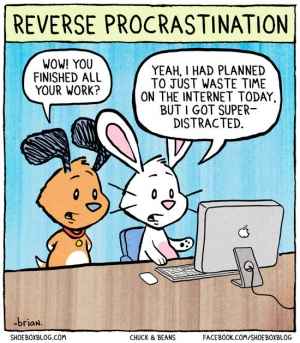Writing: The Real Reason You Procrastinate
Procrastination. It is the practice of carrying out lesser tasks in preference to more important ones, and it’s the bane of every writer’s existence. Have you ever sat down to write a story and have that urge to munch on some cake? Or have you started the final chapter of your novel and had that sudden desire to set it aside because you don’t want the story to end? No matter what the cause and effect you’ve experienced procrastination in one form or another.
What is the real reason you procrastinate?
Procrastination 101

Everyone does it. Remember that lawn outside that hasn’t been mowed for weeks, or maybe that child bouncing up and down shouting, “I want a cookie, I want a cookie!” Those are reasons for procrastinating.
It is only human nature to put things off. Sometimes we mean to do it, and sometimes we are oblivious to it. Procrastination only becomes a problem when we let it take control of our life.
The best way to determine if your procrastination is an ailment, or not, is to examine the consequences. Is it okay for you to ignore your child’s plea to write for a couple of hours? There are tough decisions to make, and sometimes it gets the best of us.
Internal consequences such as feeling nervous all the time, but following through on the task anyways. Or external consequences such as failing to meet a deadline because you preferred going on a joy ride with some friends. When procrastinating leaves you feeling upset or overwhelmed, that is when you have an issue, and it is time to rethink your priorities.
Why Do We Really Do It?
1. We are afraid.
Some writers are scared that they will fail. Whether this means that a particular project isn’t going to turn out good, or you don’t know what to write about next. This type of procrastination will often set aside their work entirely to avoid feeling disparity.
Fear of success is another habitual reason for procrastinating. The fear of becoming a workaholic, or giving friends and family the cold shoulder, can become a huge problem. It is because we are scared of losing others in our lives. This type of procrastinator usually envisions themselves locked up in a cage without a key.

Some of us get concerned that we will lose our autonomy as if there was a devalue in our independence. Delaying writing projects is a way to maintain that independence. These types of people often say things like, “You can’t make me do it. I’m my own person.” This kind of behavior will receive negative feedback, and cause a person to possibly lose their job.
We can create barriers between us and others. This will cause some strife and chaos in which we hope to keep people at bay, and leave us alone. This type of procrastinator tends to be fearful of judgement from their peers.
All of this tension can form within our consciousness or subconsciousness. It keeps us from taking action until our anxiety becomes overbearing, and we either rush our work or quit.
2. We desire perfection.
Perfectionists take to procrastination like oil and water. Those who want to perfect their work will often make mistakes on purpose because they fear their greatest potential may result in a lesser review. We don’t want this kind of judgement to be passed, and so we deliver mediocre work bearing the belief that we could have done better. Becoming attached to this ideal feels safer than risking failure. As long as a project isn’t complete a perfectionist feels that they aren’t progressing further, and they ignore the fact that each sentence written is progressing them further to their intended goal.
3. We judge ourselves harshly.
We may procrastinate our work because we don’t like what we’ve written. Maybe you had a writing assignment and your editor handed it back to you with correction marks all over it. Or you have sent a poem to several magazines, but received only rejection letters. One of the biggest deal breakers is criticism from reviewers. All writers fear that one person who is always over critical of their work. But sometimes we judge ourselves too harshly, and this causes us to set aside a project. By procrastinating we don’t have to edit our work, and thus we avoid the discomfort of judging our writings. This type of procrastinating happens because people don’t like failure, or we lack the confidence to complete a task.
4. We are too busy.

We have too many plans that coincide with our writing time. Some people realize that their schedule is booked, and they can’t change that. While other people might not realize they’re overworked at all. Whether this is because we have classes to attend, a job outside of our writing careers, family matters, or we have children to take care of. Sometimes there is too much on our plates. In this particular case we set aside our projects because we don’t have time to work on it, and this causes a lot of tension. Becoming overly stressed makes a person forget important tasks, and causes disarray in a person’s work schedule. By procrastinating a person is able to alleviate some of the stress, and thereby avoiding the problem altogether.
5. Just because it works.
Procrastination kind of lends to itself. By avoiding writing we can attend other interests that we have. Whether this might be watching our favorite television show, hanging out with friends and family, or taking that dream vacation. Writers get tired of working for hours upon hours, and procrastinating gives them the chance to take that much wanted break. Sometimes we speed write a project and receive good results. This will only feed into the need to procrastinate. When procrastinating becomes a habit it becomes too easy to throw off our projects. This is because procrastinating is an easy motivator for bad habits.
How To Fix The Problem
For most procrastinators there isn’t an easy fix, but that doesn’t mean that there isn’t any solutions. Procrastinators enjoy being self-critical of themselves, and while this makes the problems clear, it isn’t a healthy way to deal with it. Blaming yourself for your issues isn’t going to help change your habits, but rewarding yourself for progress will.

Try taming yourself by figuring out what exactly is causing you to procrastinate, and come up with a solution to stop that behavior. It is hard to know when you are procrastinating, and it is key to set some cues that will trigger a realization of when those hindering habits occur. For example, a little voice inside your head telling you something important, or a physical malady such as a headache or stomach tightness. Focusing on these cues will help you.
Determine how exactly you procrastinate. If you’re watching a television show try limiting yourself to one episode instead of an entire season. Substitute something that may seem important with something you know is really important. Maybe write in segments rather than in large portions. This will allow for some resting periods in between, but will allow the work to progress further. Instead of spending too much time researching spend some of that time describing what you’ve researched. The sooner you figure out what you do to procrastinate the quicker you will be able to catch yourself doing it. Don’t create excuses.
Creating a productive work environment can help reduce the chances of becoming distracted. If outside noise distracts you then go somewhere it is quite; like a library. Maybe your significant other is getting into your head, and causing more problems than you need. Simply leave the conversation in a calm manner and find a place away from home. If you have a laptop then go somewhere you can’t receive internet. Essentially find an environment that meets your needs and create a sound place to work from.
When all is said and done, and you can’t solve your problems on your own, then search for some help from someone else. Finding a buddy that you can confide in is one of the most therapeutic ways of dealing with procrastination. Tell someone your aspirations and deadlines, and ask them if what you are doing is realistic. Chances are you’re overreacting and your buddy will be honest with you. If you are one of those writers who doesn’t think that your writing is effective then look for a writing specialist or a writing coach. This will give you some insights into what you believe is wrong.
Here are a couple links to websites that could help you out with your procrastination and writing needs:
Procrastination Coach is a website dedicated to helping individuals manage their time, and giving motivational insight into dealing with procrastination. Doctor Christine Li manages the website and maintains a blog that provides helpful articles that focus around procrastination. Li is a licensed clinical psychologist, and has a private practice in New York City and Westchester, New York.
Bubble Cow is a website that has several links to free online writing courses. Each course provides you with information pertaining to specific areas of writing and several activities. Everyone enjoys some free help, right!
Works Cited
“Procrastination.” The Writing Center. Accessed March 23, 2015. http://writingcenter.unc.edu/handouts/procrastination/
What do you think? Leave a comment.











Kenneth great motivating article and great links I appreciate this information-thanks for sharing!
I agree with you Venus. Reading through this article has reminded me of past problems in planning and constructing drafts. I’m sure many others here on The Artifice can recognise themselves in parts of this article.
I myself realized quite a few problems I have when I wrote this article.
I’m glad to have provided some helpful information to you Venus.
I usually delay hard work because it is difficult and because I am lazy.
We have an honest man here.
I read this while I am supposed to be writing. I was a world class procrastinator in college, and experienced the “top of the class” syndrome from the other side when I taught legal writing.
My problem is that I want to get it all over and done with as quickly as possible, I’ll start one chapter or introduce a new character and i start to think on another great scene and i just cant get back to the last part I left.
Writing is a reward in itself. It is also like breathing to me. When I am not writing I am thinking about writing. I dream my stories when asleep. My problem is procrastinating about everything else. Just saying. Loved the post.
Thanks for the tips….I definitely need them!
Often we don’t write because we’re “not in the mood” or we aren’t “feeling it”. But when you force yourself (or give yourself the permission to be crap), the results can often be surprising.
YES! Sometimes the first few hundred words are worse than useless. Pushing past that however, can turn that lead into gold.
For some reason listening to music really calms me and helps me to focus – it brings back memories of those long nights spent in the library, trying to stay up while I researched for an assignment or crammed for an exam! The sound of the music in my ears always told me that it’s crunch time.
Great stuff. Perhaps these tips will help me get back started with my writing… tomorrow.
I think a lot of writers procrastinate because when push comes to shove and it’s the eleventh hour, we are able to focus primarily on writing the story or essay. Of course when you’re writing a novel this is much harder to apply or explain. A lot of novelists tend to force themselves into routines of writing early in the morning or late at night. Anyway you can focus yourself to sit down and either put pen to paper or fingers to keyboard is the way forward in the writing process. The only way it’s going to happen is by doing it.
Some people, even me, are addicted to the “Adrenaline Rush” we experience whenever we do something only at “the last minute” or the night before.
But like any addiction, if you try hard enough, you can usually overcome it.
I do battle with procrastination in its many forms every day.
I think procrastination is something that everybody struggles with. Especially for writers who work at home, there’s the double whammy of having distractions both in the home, as well as right there on your computer!
I always find it odd, how much fear is tied up with writing. I’m a victim of it, myself. Maybe we’re all just afraid to enjoy ourselves!
Nice read. I’m not too bad when it comes to putting things off, but procrastination certainly sneaks its way in from time to time.
This was a nice read. I appreciate knowing I’m not the only one with these issues!!
Great read 🙂 I often looked for literally any reason to put off writing, like cooking and cleaning. I’m slowly trying to change that mindset and so far it seems to be working.
I highly enjoyed this article, and agree with the vast majority of it.
Definitely gonna read this…
later… 😉
Same.
Actually some helpful stuff here.
I struggle, mainly because I want to write perfect and not have to write a ton of drivel in order to get a few pages of good writing. It’s dumb, I know.
Nice article!
Helpful things I’ve found is to do; “Clear the decks”: phone and email off, browsers closed, TV off, no interruptions, no distractions. Maybe some music, but that’s it.
Honestly, I can’t tell you how I fight procrastination because it’s something I suffer from. Or rather, it’s a choice I make. Regularly.
What I can tell you are the things I choose over writing: the internet and TV are huge time sucks for me. Even music. My excuse is that I “just need a little noise in the background” or some music to get me going.
I hadn’t realised that reading about writing can be procrastination, but I find it helpful when I need some encouraging words.
This is a habit that I’ve succumbed to many times. I’ll bang something out last second, because I’m under pressure, and then I expect to be able to do that for all assignments. Thanks for this article!
Great article. I agree with most of it because it gives many of the reasons why I procrastinate with everything.
I relate to this article as I procrastinate often. Thank you for helping break down the reasons that others and myself procrastinate.
Physically changing locations has been great for changing heads. Try it folks.
The problem I have always encountered with projects and procrastination is that I always manager to finish on time. Whether it was in college, or now in the work force, my projects are always finished on time, and completed well. Because of this I have never had that moment of, Oh Crap, I should have started earlier. I tend to deliver higher quality work in high pressure situations. Procrastination is a handicap for sure, but it can also be a motivator, in my case at least.
This is incredibly accurate to my experience with writing – especially the fear. You’ve touched on a lot of truths here, thanks for sharing!
Good advice and reasons you addressed! I didn’t realize how a busy work schedule can lead to procrastination, as well as self-doubt(to some extent). I’m so glad that I found this. Thanks Kenneth Merchant!
Great article! I find it hard to start writing because I am scared that it will not turn out the way I visualize it. However, writing is rewriting– it is important to just get your thoughts down and you can tune it later! 🙂 Thanks for the tips!
As a writing I feel like the main reason behind my procrastination is the desire for perfection. This article was spot on and very informative.
When writing an essay or research analysis, I tend to procrastinate when I lack the proper sources. This tends to frustrate me, I feel as if the cure is to put some non-vocalized music, open all your sources, close all irrelevant sources, and making a plan to achieve step by step what you intend to write, and write it!
Well this is some really good piece of advice. Everyone who thought of procrastination the work might end up actually getting benefited from that. I got too. Thanks.
This was a good write up especially for me, who is a procrastinator (really not proud of it). Thanks for the tips.
As a university student, I am an accomplished procrastinator. The problem is that I still receive positive feedback on papers that I leave to the absolute last minute. The professors aren’t aware of the circumstances in which the paper was written (in a 12 hour marathon fuelled by coffee, chocolate and cigarettes. This reinforces my mental adoption of procrastination as a positive motivator. Your article has given me some insight and options into what I can do to change this. Thank you.
I know what you mean. Sometimes papers that I write last minute get a better grade than ones done two days before. The fact that it works makes procrastination an ok thing to do…
I’m the Queen of Procrastination. Thanks for this article. I would like to relinquish my crown before beginning grad school.
Procrastination has been a major problem for me over the years as well. It’s strange though, because I used to have so many things going at once when I was younger, and I had no problem juggling it all.
I think the best advice I’ve gotten is to, “just do it!’ It DOES require a lot of mental effort, sometimes physical effort, to accomplish big tasks – especially writing ones. In the end, it is worth it though, because you really do feel like you accomplished something.
I also go between being hyperattentive towards something I am very passionate about, to not caring much at all, even when it is something very important and needs to be completed ASAP.
Also, you may simply have no interest in the task you’re trying to complete, and you need to question whether or not you enjoy what you’re supposed to be doing, especially if you signed up for it. If you’re required to do something out of your control, then that’s another story.
Seems today is the day for articles on procrastination. The Atlantic had an article entitled The Procrastination Doom Loop—and How to Break It: http://theatln.tc/1ldfFK3 . It talked about procrastination from a mood perspective than a time management one, as this article also talks about at the beginning.
Fear is truly the mind killer, and now I have two websites to help me be productive. That’s the take away from this piece at least for me.
I also struggle when I have so many things to do that I don’t know where to start. Lovely article – definitely put some of the reasons why I procrastinate into light. I never realized this about myself until now – thanks!
As a writer, procrastination is my biggest problem. The article was both insightful and helpful in regards to fixing this problem, thank you.
This is such a great article! And I find the tips for procrastination prevention really helpful.
Fear! Thank you for naming it.
Great article! I am a huge perfectionist and procrastinator so I can definitely relate to this.
Addressing a really important problem for most people including myself.
This article is rather applicable to many typical targets of procrastination besides writing, which is great.
For those writers who need sources but are distracted by the internet, physical copy sources are fantastic, and are usually more focused. Just something I found that a lot of people seem to forget about. I love going to the library and grabbing a few books relating to my topic and hand writing the notes. Keeps me focused on my task (for both stories and essays).
I found some of these points really interesting, mostly because there are a few I’d never think to associate with procrastination. It was definitely thought provoking!
I love the start towards beating procrastination. I think there is truly so much to it though and there really isn’t a way to write out everything to help beat it or the different types. Heck, it could even be a mix of some. But this is an excellent resource to use to take the steps necessary to be able to prioritize. I have the Procrastination Coach website up now and want to really take a look at that as well to get into the mindset of using my time wisely each day to work, write, relax, have family time, and keep up with the house care that I need. Definitely my kind of article!
Well done. I really enjoyed reading this article. Helpful tips and references.
i totally agree with you on everything. I am not a perfectionist, neither am i too busy, but i am scared of judgements though. My major problem however, is in-depth meaning. I am currently taking an English course which requires me to make various analysis’. I want to write a book, In fact, i need too, if the constant niggling voice in my head is anything to go by, but i am overthinking, thereby procrastinating. I am worried about what every word will signify, and how it will be interpreted, thus i am putting off my book writing. Please, how do i stop?
I’ve been feeling lost in terms of my writing career lately but joining this site and reading articles like this is helping me get back into that groove. Thank you!
Thanks for the article. Midway through college, I realized that my procrastination was caused by my fear of failure, my expectations of perfection, and my tendency to be too harsh on myself. Since I’ve become married and had children, I can add being to busy to my plate. Along with some of the strategies you’ve provided to alleviate the allure of procrastination, I’ve discovered that taking on the each problem one at a time has yielded some success. Having less control over how busy I am with family, for example, has forced me to renegotiate my tolerance for inevitable imperfection.
Very useful. Thanks for writing. Of all of these, the lure of perfection seems the trickiest. Watch out!!
very constructive
I delay writing because I get lazy… but thanks for the reference to BubbleCow! Free is for me.
I love this. This is completely accurate. I think this is perfect for understanding the “art of procrastination”, as well as how to avoid doing it.
In regards to being too afraid of failure to write, an important thing to remember is that your first draft will always be a mess. You may think it sounds great while writing it, but be prepared to let it go when you rewrite. You first draft is just clay for molding; not very nice to look at, but necessary for your finished product.
Many times, what I love doing as means to relax becomes the same factor why I procrastinate. For instance, I like watching anime. It helps me come up with a new topic for my blog. But at the same time, I can’t seem to stop once I started watching the first few episodes. Before I know it, I’ve finished the whole series…Bad thing is, I get too tired to write after. #procrastination
If you have the ability to procrastinate, then you should be as stiff as a piece of clay that does not melt due to heat, but we all know that something plastic will melt once exposed to heat, so who wins? the clay, right?
This is because clay is more stronger and durable than plastic since it withstand the pressure of the heat or in other words, someone who is strong enough to procrastinate can endure the pressure of their overloaded work that they have responsibility to finish on time.
I think the reason that I procrastinate is because I have a perceived sense that I have too much work to do, rather than that actually being the case. I just feel helpless sometimes, and think to myself, “Why bother starting if I’m never going to get it all done?”
Really cool article! Enjoyed the information. I am the king of procrastination! Nothing to be proud of, but everyone deals with it.
This is a great article. This explains me perfectly! I’m procrastinating as we speak, and I know it’s because I’m afraid. I’m in the same rut–work always seems to get in the way of everything I want to do, particularly with writing. Every time I allow time for writing, I become distracted with nitpicking tasks, anxious thoughts, and before I know it, I’ve lost the original idea I wanted to write about. When I’m not writing, all I can think about is writing.
Fear of failure and what other people may think of my writing is what usually drives my procrastination. Not to forget that fear of success also puts so much pressure on me. What if I succeed and I can’t handle the consequences? What people might think of me? This is my biggest nightmare!
Anyway, this is a great article and I enjoyed reading it.
Failure is certainly a key factor mentioned!
Wow. I assumed that I would just read anything any other article has said on procrastination but this one was so in depth. I have the busy life of being a college student, working Monday-Friday with children, being the Sales Manager at my college newspaper, and trying take off with my own blog! It seems overwhelming most times and I still try to find other writing projects because I love it so much. But this has made me feel much better about my hectic situation. I hope to apply this to my life!
Fantastic article. Procrastination is a problem that I think encompasses a little bit of all of us.
I saw the point about taking your laptop and going somewhere without the internet…..I just realized that when I wrote the rough draft for my novel, it was on a desktop computer and I had no internet. I would sit and write for exactly thirty minutes each night. This was high school but now I’m in college and have a laptop and the internet is everywhere and I never get as much writing done. Thanks for this article, it has made me realize that I need to return to my old roots.
I think this really hits the nail on the head. To write, especially about something close to the writer, is to be vulnerable. I’ll for sure check out the links that are provided.
For the majority of the time I procrastinate because of lack of motivation and a busy schedule! The links are very helpful and it’s easy to set a date to work, the hard part is sitting down and doing the work so you have more time to improve your work!
All true. It took me YEARS to actually start my blog and start my journalistic career.
The benefit you get from procrastination might be on that by investing time in B instead of doing A (the must) , you find your true passion which is B:)
I can see the benefit from procrastination — by investing time in B willingly instead of doing A (the must) , you find your true passion which is B:)
Have you ever read the ‘War of Art’ by Steven Pressfield? He talks about procrastination (he calls it resistance) and why we like to succumb to it and what happens if we do. He also talks about how to get over it. Basically it is a ‘kick you in the butt’ type of book. Really helped me start writing again.
Between school and working on stuff that I’m attempting write, my distraction tend to come from social media for my homework, and a shiny new idea separate from what I’m currently working on. My environment isn’t really conducive to writing, so until I move, my focus tends to feel very forced.
“Thanks for the informative and motivating article,” I say as I attempt to get off the Internet and write.
Oh, man. Apparently I should not have read this but rather, written that poem.
Well, that’s pretty much true.
Then again, as long as I am actually accomplishing something useful (which may in fact be surfing the internet and coming across an article about procrastination), then perhaps I am just avoiding. Is that the next article?
Actually, I follow the logic of Lazarus Long: “specialization is for insects.”
(Now I’m wondering if ants procrastinate. I sorta doubt it.)
This is a beneficial article to help acknowledge my procrastination writing. It helped me realize how harshly I judge myself because I just want everything to be absolutely perfect.
Not writing maybe a simple case of not having anything to write about or at least anything interesting to write about. The last thing anybody wants to write is a boring piece that you are not proud of, hence the fear of failure therefore procrastination. I remember one Professor advising to write everyday and small details were important. Another advised to write in a genre that I seemed to write well in, real life. Write with a pen and let the words flow, edit later! Time goes by fast.
Finally! I’ve never seen a straightfoward account of this very real problem until now. You really hit the nail on the head and actually, helped me out.
Fantastic article. . . I’m betting you procrastinated writing it though, huh ;). After reading through I realized that I would often use procrastination as a way of not getting distracted while writing essays in school simply because, due to waiting, I couldn’t waste time. This was a terrible use of my day, I now realize, and often ended with me becoming more stressed than proud of my work. Thanks for the tips!
I am definitely guilty of procrastination when it comes to writing. In fact, I’m supposed to be writing something write now…I don’t suppose this comment counts.
I actually do the “I didn’t try my best” trick a lot. It’s scary to realize that even your best may fall short of your standards.
I rarely procrastinate when I have external deadlines. My real problem is writing for myself. I wish there was a way I could externalize my personal writing projects.
There is nothing like a ticking clock to really get my brain going. As an undergrad, my procrastinated papers always got better grades than ones I worked on ahead of time.
great works welcome
AWW Procrastination. I am betting you procrastinated doing this article ;). I myself, am avoiding wring something, but it is true that all of these elements are a problem involving procrastination. thanks for bringing it up
I never realized that part of procrastination was perfection. It’s good to address that side of not doing things because it is so true. Thanks for a relevant read!
All good tips in the article on how to get out of the procrastination rut. However, sometimes procrastination is more than just a minor or temporary distraction; it can actually be a habit.
Habits allow us to not “think” about what we are doing, they’re an automatic response to stimuli. Need to write something; reach for cake instead. Finished the cake and now it’s time to write something? Hmm, maybe I’ll go watch some television. You get the idea…Fear or perfection might be holding you back, but it’s likely that your habit is holding you back more!
As you can see, habits can help speed up some activities (eating a lot of cake!), but they can also inhibit us from being successful. In fact, if you examine the results of your life and if you’re honest with yourself, you can quickly attribute your results to your habits.
For instance, if you choose to procrastinate, if you consistently neglect to deliver on promises, if you handle work more than once (i.e., keep shuffling your “to-do’s” to the back of the pile consistently), if you save opened email in your inbox; then all of these habits lead you to experience a more stressful life. And with repetition of bad habits, stress compounds to create even more stress.
Stress really compounds the procrastination problem!
Research shows that up to 90% of our behaviour is based in habit; but research also shows that habits can be modified in as little as 12 weeks.
While the reasons why we engage in self-defeating habits can be as varied as the individuals themselves, there are ways to get on the track to success.
Here are the steps you can take to eliminate your bad habits:
1. Write down your negative habit – i.e., “I procrastinate.”
2. Identify behaviours that will replace procrastination.
4. Start practicing the new behavior(s) every day and keep practicing for at least three months until procrastination is replaced by the new behavior(s). To help with this, use reminders–perhaps by placing post-it notes in locations you can’t miss, using pop-up reminders/alarms in your email calendar, or engaging others to assist you (e.g., coaching, telephone or other reminders, etc.).
5.Commit to a “no exceptions” rule to stay on track with your new habit.
The last item, committing to a “no exceptions” rule is very important. If we waver even slightly, our efforts may not pay off. Imagine if organizations decided to be “flexible” with their policies and procedures and allowed some exceptions, claiming that 99.9% is good enough. This would mean that your municipality would be okay with providing one hour of unsafe drinking water per month or two unsafe landings at major airports each day would be acceptable or it’s okay for doctors around the country to drop 50 newborn babies at birth every day: I’m sure you’ll agree that none of these scenarios is acceptable.
“Instead of spending too much time researching spend some of that time describing what you’ve researched.”
I feel that this point is particularly poignant. There are many instances where it is very clear that I’m procrastinating (I’m really bad for procrati-cleaning or procrasti-cooking). More often than not, however, I spend hours doing ‘work’ that seems useful which is, in reality, just procrastination wearing a mysterious disguise. Sometimes it can be very hard to move forward from the stage of acquiring knowledge and into the forward momentum of commenting on or shaping knowledge. I think you’ve pinpointed a crucial step in overcoming that problem. Even if writing about your research seems like a pointless annotation, the process of actually thinking about the information you’ve encountered and putting it into your own words generally jump starts the writing process (at least for me). Great tips for overcoming the stress of procrastination, in both its obvious and more dubious forms!
Thanks for the article. As an academic, I need deadlines. I procrastinate so badly sometimes that I wish someone else would just give me a “pretend deadline” even. (I’ll talk myself out of it somehow!) Also, I agree that I spend way too much time researching before I’ll actually start writing. I’m doing that currently with a book I’ve been working on forever. It’s so difficult to make that final transition.
Good post! Delay can ruin your business when you are in a peak in the business!
Good article 🙂 I think your suggestions to fight procrastinating are really helpful. I think the biggest problem I have is sitting down to write and trying to get an entire project done. Then I get overwhelmed and don’t get any of it done. Sometimes it is more effective to write in small chunks at random times then for a long time in one sitting.
As someone who’s excelled at the art of procrastination, I found this article to be very satisfying and motivational. Thank you for this.
A well-written and useful article. I was aware I was procrastinating for a lot of the reasons given, but having a reminder is always nice.
Helpful writing ! Thank you for investing your time writing this .